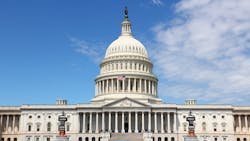Calling the US ‘Protectionist’ on Trade Is Delusional
European leaders are up in arms over Washington’s recent moves to reshore U.S. industry. In particular, they’re upset by federal tax credits for American-made electric vehicles (EVs) and batteries. French president Emmanuel Macron has called this a “killer” for France’s automotive industry. And now, The Economist believes America is “protectionist”—and is “fracturing” the international trading system.
These are ridiculous accusations. And if anything, they come late in the game—since America’s manufacturing sector has been shrinking for decades. In truth, Washington’s recent push to build a domestic EV sector could actually pave the way for a new approach to global trade—with the United States focusing on production, not “protection.”
There’s great irony to labeling the United States as “protectionist.” America continues to be far and away the world’s largest global consumer—and last year imported more than $3 trillion worth of goods. The average U.S. tariff on all of these imports is only 2.3%—one of the lowest in the world, and significantly less than the European Union’s average tariff of 3.2%. In fact, the EU tariff on imported automobiles is 10%. In contrast, the U.S. tariff on imported cars is a mere 2.5%.
This is the reality behind the “rules-based order” that The Economist favors so highly—including the massive, annual trade deficits that the United States continues to rack up. It’s not America that’s protectionist. Instead, the global trading order continues to punish America’s generosity while providing no meaningful penalties for nations that abuse the system.
The answer is for the U.S. to pursue “productivism,” a term coined recently by Harvard economist Dani Rodrik. What Rodrik suggests is a new approach that prioritizes production instead of consumption.
Rodrik is right. The problem is that boosting consumption—especially of imports—may provide immediate consumer gratification. But it does nothing to grow a country’s long-term capacity to generate goods and services that provide meaningful sources of income and wealth. However, boosting domestic production—especially over multiple years—is far more important, and should be the number one economic objective of any democratically elected government.
There are signs that productivism is already getting bipartisan support in Washington as a means to boost manufacturing in depressed regions and communities across the country. Productivism also marks a clear repudiation of the free-trade theories that The Economist has long espoused. It’s a new economic approach—different from the simplistic, pro-free-market solutions of traditional neoliberal conservatives and the equally simplistic tax-and-spend solutions of traditional welfare state liberals.
Productivism should guide the U.S. government for the next decade and beyond. A domestic manufacturing resurgence could generate long-term prosperity and economic growth—the surest way to deliver persistent gains in real income for the working poor and the middle class. Even the non-working will profit because voters will be more likely to support redistributive policies if they can see an upward path for their own incomes.
The complaints of The Economist and others are based on a false conception of economics. “Economies of scale”—the claim that it is cheaper to concentrate production in one place—is the cry of businesses that have lost the ability to innovate. Toyota defeated General Motors with smaller factories in many locations. Tesla also understands that “right-sized” factories are better than huge factories. And that’s even before we consider the national security issue of making the entire world dependent on a single far-off nation, such as Taiwan, for a key commodity, semiconductors.
Today’s “hot” industries, including EVs, renewable energy equipment, and microchips, are already multi-billion-dollar markets in the U.S., Europe and Asia. The U.S. can choose its own policies to support such advanced production. And doing so can maximize national security, technological progress, employment, and investment. It’s time for Washington to finally start investing more in America’s workers and manufacturers.
Jeff Ferry is chief economist at the Coalition for a Prosperous America. Twitter: @menloferry
